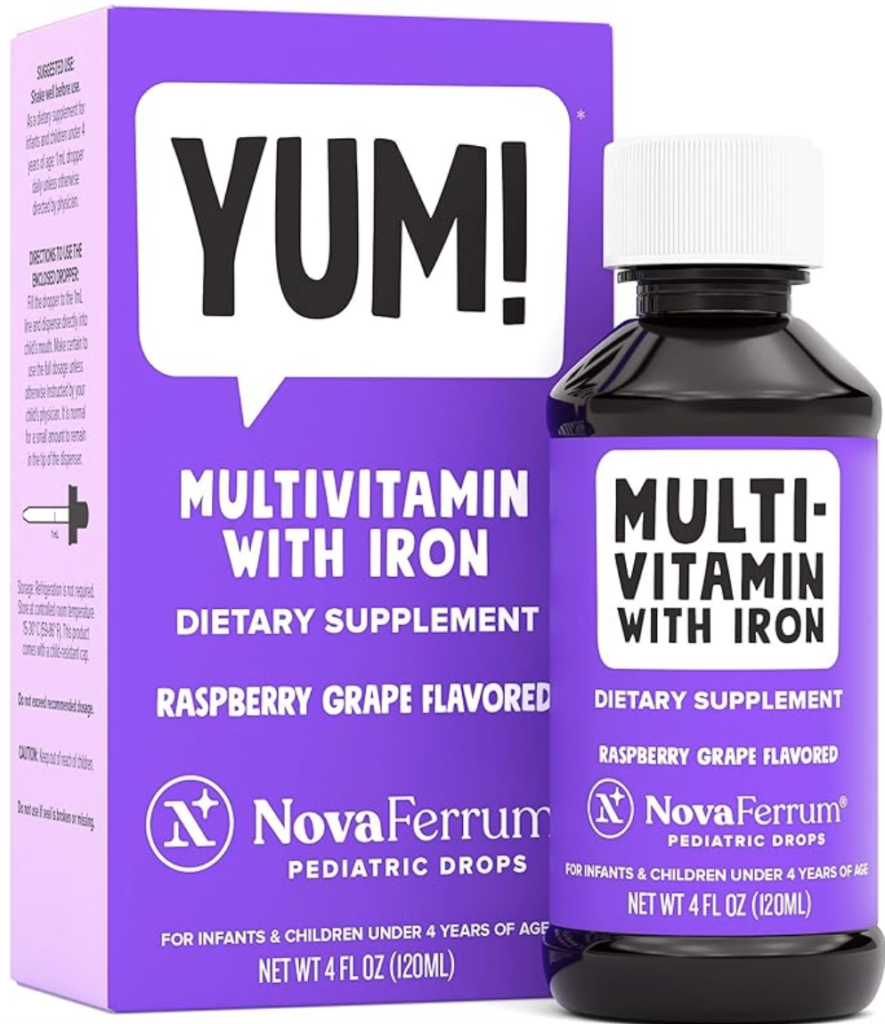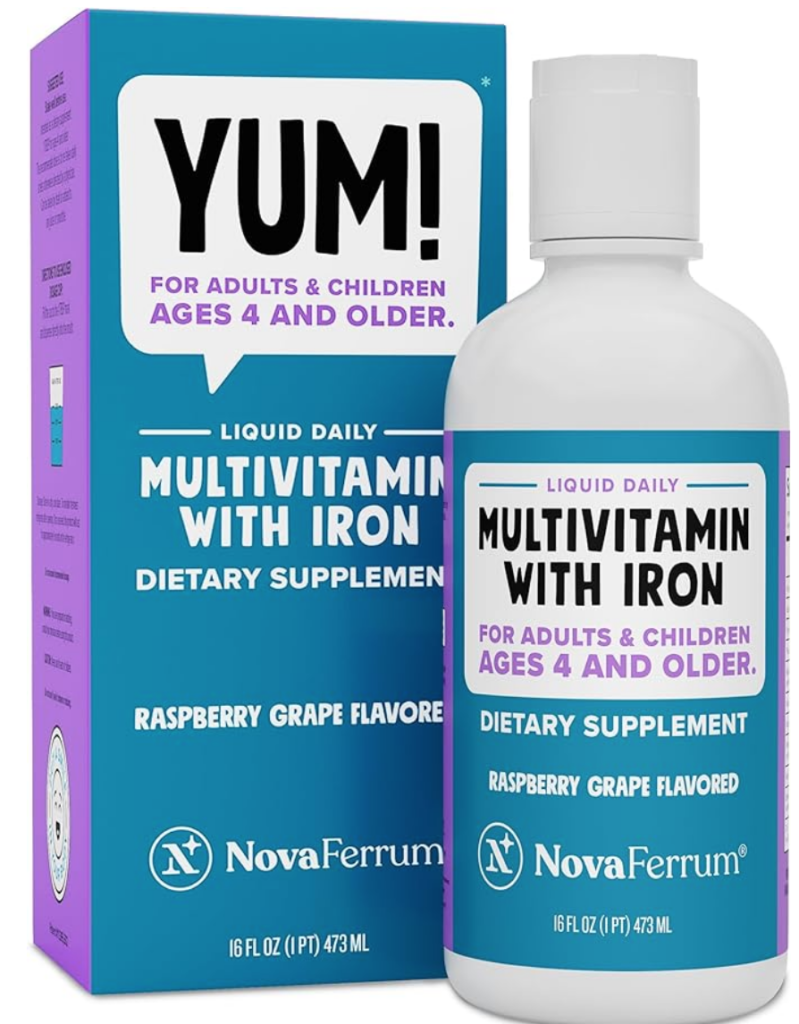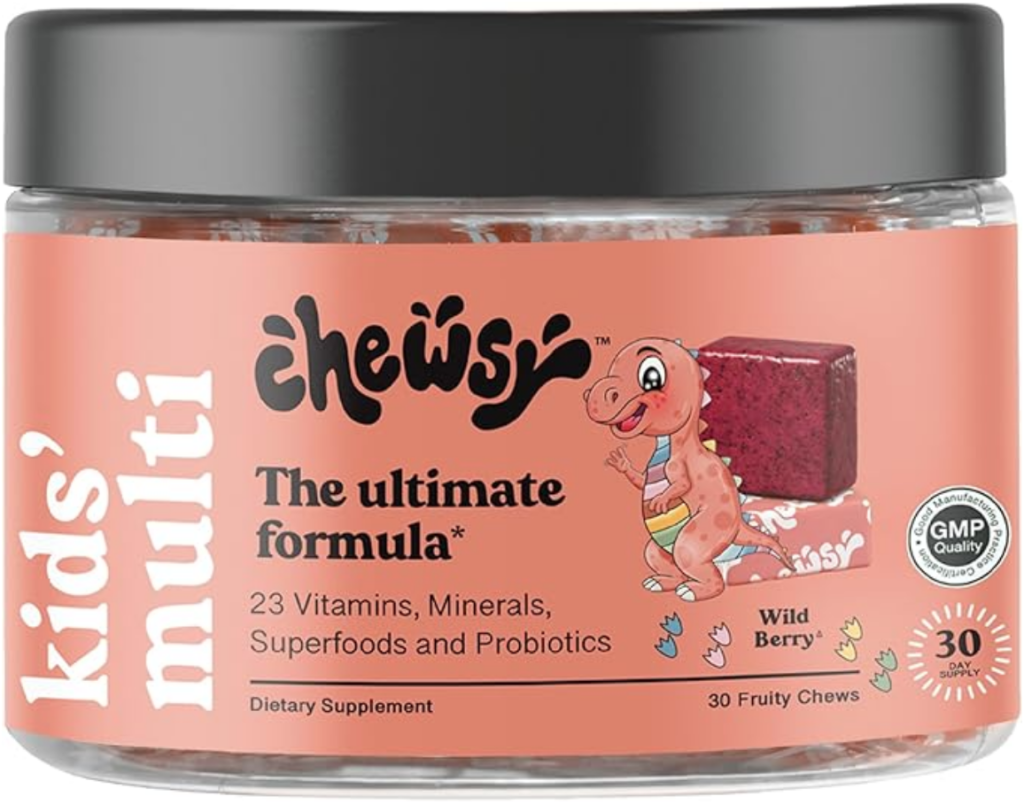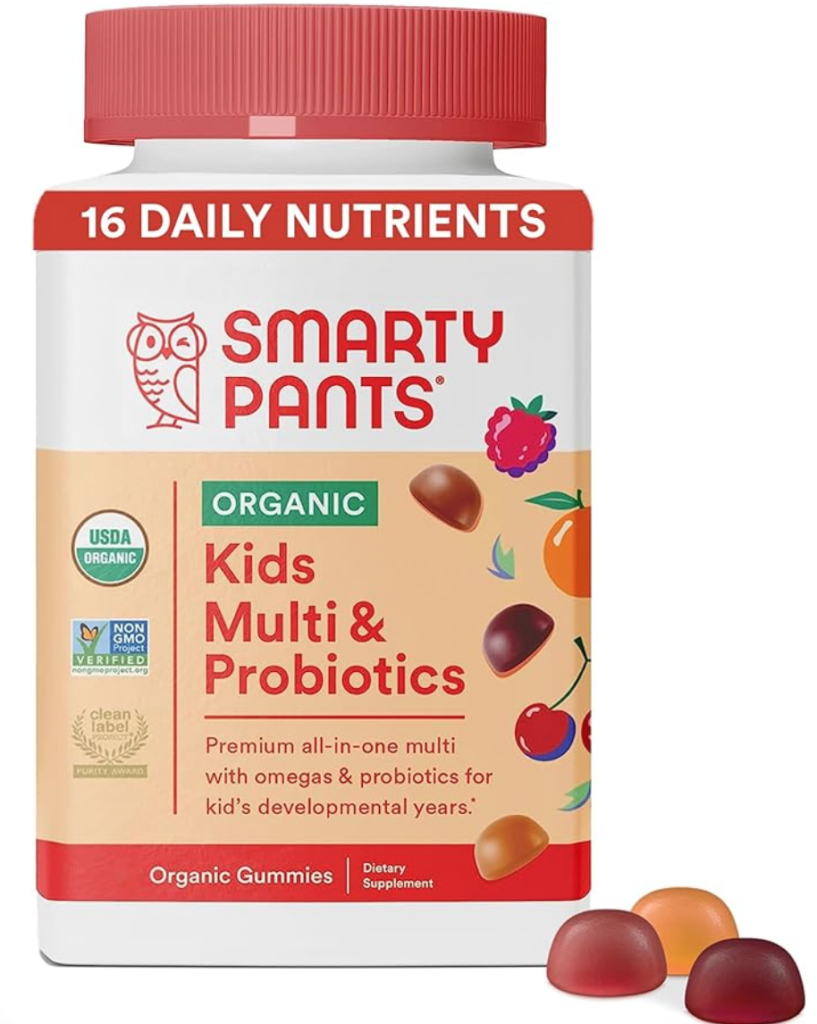Take a look at the best multivitamins for kids in 2024 as we cover top brands, essential nutrients, and tips for choosing the right supplement.
 Best Overall Option |  Best Option for Picky Eaters |  Best Budget Friendly Option |  Best Organic Option |  Best Gummy Option |
Vitamins A, B (2, 6 & 12), D3, E. Contains iron. Sugar free - naturally sweetened. No artificial colors, sweeteners or flavors. | Vitamins A, B (1, 2, 5 &12), C, D, E. Folate, biotin, calcium & zinc. Zero grams sugar Chewable tablet. | Vitamins A, B (1, 2, 6 & 12), C, D3, E, and folate, biotin and zinc. 3 grams of added sugar. Chewy squares. Non GMO. No artificial colors, flavors or sweeteners. | Vitamins A, B (1, 2, 6, &12), C, D3, and K2 as well as Zinc, Omega 3's and probiotics. 4 grams of added sugars. Gummy. | Vitamins A, B (1, 2, 6, &12), C, D3, and K2 as well as folate. 2 grams of sugar. Non GMO, vegan & gluten free. |
$29.99 | $30 | $13.94 | $29.29 | $41.95 |
This post contains affiliate links. If you purchase through these links, I will earn a commission at no additional cost to you. Your support helps keep this blog running. All opinions expressed are my own.
Why Do Kids Need Multivitamins?
As parents, we’re always looking for ways to ensure our children’s health is the best it can be. But with so many options and opinions out there, it can get a little overwhelming to decide what is best for you family. Keep reading as we discuss the top multivitamins for kids, breaking down what makes them stand out and why they might be the best choice for your child.
I am not a medical professional, physician, or licensed healthcare provider. The information presented in this blog post is for educational and informational purposes only. It should not be considered medical advice, diagnosis, or treatment.
Always consult with your child’s pediatrician or a qualified healthcare professional before starting any new supplement regimen, making changes to your child’s diet, or if you have questions or concerns about your child’s health. Every child is unique, and their individual health needs may vary.
Nutritional gaps
Unfortunately, it is quite common that kids these days aren’t receiving the various nutrients needed for their growing bodies. With the rise in processed foods comes the decline in nutrient-rich foods. In addition, our busy lives often lead to less home-cooked meals and more fast-food which also greatly lacks nutritional balance. This means our kids are not getting what they need for their rapidly developing bodies. This gap in nutrition is a cause for less energy, slower cognitive development, weak immune systems and slower growth. Multivitamins can help fill the gaps. However, I think it is incredibly important to note that receiving those vitamins and minerals directly through organic and whole food choices is best for our bodies.
Picky eating
Picky eaters are more common than you might think! It can be hard to get our little ones to eat a variety of foods, and sometimes it may feel like it isn’t worth the battle. But unfortunately, when these picky eaters don’t have enough variety and balance in their diet, they are lacking necessary nutrients. This is where multivitamins can help fill the gap until you can get more variety in their food choices.
Benefits of multivitamins
A great way to think of multivitamins is as a “safety net.” You don’t want multivitamins to be the only way your kids are consuming certain nutrients. BUT, they can be helpful in ensuring your kids get the right amount of nutrients for their growing bodies.
Multivitamins can help support kids overall growth and health, boost the immune system, improve cognitive function, support healthy bones and teeth, and increase energy. As mentioned before, multivitamins are a great way to fill the gaps, but they shouldn’t be used as a replacement for a whole foods balanced diet.
Common nutrient deficiencies
Unfortunately, try as we may, there are still some common nutrient deficiencies in kids.
- Vitamin D: The sunshine vitamin – This one is really important for bone health and the immune system, but it is often hard to get enough of through food and sun alone. Most of my family takes vitamin D3 supplements since we have been known to be deficient in absorption of vitamin D.
- Iron: Although iron deficiencies affect less children than vitamin D deficiencies, it is still important to consider looking for in a multivitamin. Iron is vital for brain development and cognitive health.
- Vitamin B12: This is important for brain function and energy. It is more common for vegetarians and vegans to be deficient in B12.
- Omega 3 Fatty Acids: This is typically lacking in modern diets and affects brain development as well as eye health.
This list is meant to inform you, not scare you. A multivitamin is most effective when paired with a healthy and balanced diet. For more detailed information on food sources for these vitamins, check out this blog post!
Key Nutrients to Look for in Kids’ Multivitamins
Essential vitamins
- Vitamin A: Supports the immune system, healthy vision and healthy skin.
- Can be found in sweet potatoes, carrots and spinach.
- Vitamin B: There are 8 types of B vitamins which can be consumed through a balanced diet of lean meat, grains, fruits and veggies. B Vitamins aids in converting food into energy and its supports brain function.
- Vitamin C: This is important for building and maintaining a strong immune system.
- High amounts found in guava, sweet red peppers, kiwi, lemon, strawberries, oranges, broccoli, and papaya
- Vitamin D: Important for bone health, calcium absorption, and the immune system. Vitamin D can be absorbed from the sun, but it is often difficult to receive the recommended amount this way. The following are food sources that also offer vitamin D.
- Salmon, Sardines, Herring, Tuna, egg yolks, mushrooms, and fortified foods/beverages such as orange juice, cereals, and cow milk.
- Vitamin E: This acts as an antioxidant, supporting immune health.
- Can be found in nuts, seed and vegetable oils
- Vitamin K: Important for bone health and blood clotting
- Can be found in leafy greens and Brussels sprouts
Essential Minerals
- Calcium: Important for bone development, blood pressure regulation, nerve transmissions and muscle contractions. The following are food sources high in calcium:
- Dairy products, beans, peas, lentils, almonds, chia, flax, spinach, collard greens, kale, okra, cabbage, broccoli and Brussels sprouts
- Iron: Iron is vital for brain development, cognitive health and energy. The following are food sources high in Iron:
- FISH: Clams, oysters, sardines
- PLANTS: white beans, fortified oats, soybeans, lentils, spinach, cashews,
- OTHER: fortified breakfast cereals, dark chocolate, beef liver
- Zinc: Important for immune function, taste and smell. The following are food sources high in Zinc:
- FISH: Shellfish
- PLANTS: Legumes, seeds, nuts, whole grain, potatoes
- OTHER: Meat, dairy, eggs, dark chocolate
Essential Omega-3 fatty acids
These are fats that are essential for brain development and function. It is also important for eye health and can even improve attention and behavior in children. The following are food sources high in Omega 3 fatty acids.
- FISH: Mackerel, Salmon, Cod liver oil, Herring, and Sardines
- PLANTS: Flaxseed, Chia, Walnuts, Soybeans, Spinach, and Brussel Sprouts
- OTHER: Pasture raised eggs and grass-fed meat and dairy products
Remember, multivitamins should not be used as a replacement for healthy and balanced diets. Multivitamins work best for filling in the gaps. Always consult your child’s pediatrician before choosing a new multivitamin or any other supplement.
Top 5 Multivitamins for Kids in 2024
The following are my top 5 picks for multivitamins for kids based on ingredients, taste, and affordability.
Best overall pick for kids multivitamins
- NovaFerrum YUM
- Contains vitamins A, B (2, 6 & 12), D3, E, as well as iron (iron is particularly hard to find in most other multivitamins). This multivitamin is sugar free but naturally sweetened, so it has no artificial colors, sweeteners or flavors.
- They have an option for children under 4 and for children above 4 yrs old/adults.


Best multivitamins for picky eaters
- Hiya
- Contains vitamins A, B (1, 2, 5 &12), C, D, and E as well as folate, biotin, calcium and zinc. It has 0 grams of sugars and comes in a chewable tablet. A 1 month supply costs about $30.

Best budget-friendly multivitamins
- Chewsy
- These chews are Non-GMO, vegetarian friendly, and don’t include any artificial colors, flavors or sweeteners. Contains vitamins A, B (1, 2, 6 & 12), C, D3, E, and folate, biotin and zinc. Only 3 grams of added sugar which is less than many other brands! Includes vitamins, minerals, superfoods and probiotics. Comes in chewy, candy-like squares. Very affordable at less than $15/month.

Best organic multivitamins
- Smarty Pants
- It contains vitamins A, B (1, 2, 6, &12), C, D3, and K2 as well as Zinc, Omega 3’s and probiotics. It has 4 grams of added sugars and comes in gummy form with 3 flavors. A 1 month supply costs about $25.

Best gummy multivitamins
- First Day
- This gummy has only 2 grams of sugar and uses organic fruits & veggies, no artificial ingredients, and is Non-GMO, vegan and gluten free. It contains vitamins A, B (1, 2, 6, &12), C, D3, and K2 as well as folate. A 1 month supply costs about $40.

How to Choose the Right Multivitamin for Your Child
Multivitamins based on age
It is important to understand that multivitamins don’t work for every age, so you should make sure you are giving your children the right doses and vitamins they need for their specific stage.
- Infants (0-12 months): Most nutrients for infants are received from breast milk or formula, but a vitamin D supplement is almost always recommended. Check with your pediatrician about starting a daily Vitamin D supplement if you haven’t already.
- Toddlers (1-3 years): Toddlers need vitamins to support rapid growth and fill the gaps in the picky eating stage. My toddler was taking Vitamin D, Magnesium and Iron supplements separately, but we have now switched to the NovaFerrum YUM multivitamin with iron which was recommended by our holistic pediatrician.
- Children (4-12 years): Children are rapidly growing and need vitamins to support brain development and cognitive function, bone health, and immunity.
- Teens (13-18 years): Teens still need many of the same vitamins as younger children, but keep in mind they require higher doses of certain nutrients to support puberty and continued development.
Always check labels for age-specific recommendations.
Specific health concerns
Some children may need more of one vitamin than another. Always consider your child’s unique position when choosing which multivitamin is best for them. Take some of the following situations into consideration:
- Athletes- May benefit from extra vitamin D and Calcium
- Vegan/vegetarian – Often need extra Omega 3, B12, iron and zinc.
- Allergies – Triple check the label for allergen-free options.
You know your child best, so consult with your pediatrician first, then double check the labels to ensure your child is getting the nutrients they need.
Check for testing & certifications
It is important to check for third-party testing and certifications to ensure your multivitamins are being produced with quality ingredients and processes. Consider checking for some of the following when choosing which multivitamin is right for your children.
- NSF certified – indicates testing for quality & safety
- GMP certified – “good manufacturing practices” ensures consistent production with quality standards
- Non-GMO Project Verified – ensures lack of genetically modified organisms
- USDA Organic – ensures ingredients are organic (which also means better farming and eco-friendly practices)
Taste & Form
Kids multivitamins typically come in liquid, chewable tablets, or gummy/chewy form. Consider the following and weigh that with what your child will enjoy most to ensure they actually take their vitamins regularly!
- Gummies/chewy multivitamins can las to cavities since they stick to the teeth and often contain more sugar.
- Liquid may pack a powerful (but not as delightful) punch when it comes to taste. However, it is often the choice for infants and young toddlers since gummies and tablets aren’t safe to eat yet. Remember, with liquids you can also mix into drinks to soften the taste.
- Chewable tablets typically have a chalky texture, but they often have more nutrients that gummies.
Potential Side Effects and Safety Considerations
Common Side Effects
- Upset stomach/nausea – to avoid, make sure to take after a meal rather than on an empty stomach. If nausea continues even after consuming food prior to consumption, contact your child’s pediatrician.
- Headaches – may occur as body adjusts to new vitamins. If they continue, contact your child’s pediatrician.
- Strange taste – typically harmless and should disappear quickly .
- Constipation – this may occur, especially with iron-rich multivitamins.
Remember, ALWAYS talk to your child’s pediatrician before starting any new medication or multivitamin. Seek their expertise if any side effects do arise as these symptoms could be pointing to something more severe.
Storage
- Store in a cool and try place.
- Use childproof containers to avoid overdose.
Risk of Overdose
Just because multivitamins are a good thing doesn’t mean you can’t have too much of them! Unfortunately, vitamin overdose is more common than you think! So keep those bottles stored with safety seals and where your kiddos can’t reach them!
- Certain vitamins can accumulate in the body, and an excess of these can be dangerous for children.
- Too much iron can be particularly dangerous.
- Keep an eye out for signs such as nausea & vomiting, headaches, and kidney problems.
- Consult a doctor right away if your child has consumed more than the recommended dosage of multivitamins.
Pairing with other medications
As always, consult your child’s pediatrician before offering multivitamins, but especially if your child is taking any other medications. Vitamins can affect certain antibiotics and other medications. ALWAYS let your pediatrician know if your child is taking any supplements.
Incorporating Multivitamins into Your Child’s Routine
Be consistent
Consistency is key in most things, and taking multivitamins is no exception! Pick a time of day such as right after breakfast or dinner to give your child their multivitamins. This will help you both establish a routine and actually remember to take them! If you’re still having trouble remembering, use a monthly chart and let your kids mark off each day with fin markers or stickers. There are easy and fun ways to ensure your child is getting the supplements they need!
Supplement a balanced diet
Remember that multivitamins are NOT meant to replace a healthy and balanced diet. They are simply a “safety net” and can be used to fill in the nutritional gaps your diet might not be covering completely. Try to focus on making sure your child’s meals are balanced with a variety of veggies, fruits, whole grains, lean proteins and healthy fats. Don’t forget that it starts with you! Your kids will be much more likely to follow your lead if you are doing what you ask of them too!
Disclosure: Important Health Information
I am not a medical professional, physician, or licensed healthcare provider. The information presented in this blog post is for educational and informational purposes only. It should not be considered medical advice, diagnosis, or treatment.
Always consult with your child’s pediatrician or a qualified healthcare professional before starting any new supplement regimen, making changes to your child’s diet, or if you have questions or concerns about your child’s health. Every child is unique, and their individual health needs may vary.
The content in this post is based on general information and should not replace professional medical advice. Your pediatrician is best equipped to provide personalized recommendations based on your child’s specific health status, medical history, and individual needs.
Remember, while multivitamins can be beneficial for some children, they are not necessary for all kids and should be used under proper medical supervision. Your child’s health and safety should always be the top priority.
By reading and acting on the information in this blog post, you acknowledge that you understand and agree to this disclaimer. When in doubt, always err on the side of caution and seek professional medical advice.
Wrapping it up
Choosing the best multivitamin for your child doesn’t have to be stressful! Start by considering your child’s needs, focusing on essential nutrients and clean ingredients, and evaluating which nutrients your child is most likely lacking via their daily diet. Remember, while multivitamins can be a great addition to your child’s routine, they are NOT and should NOT be a substitute for a balanced diet. Always consult with your pediatrician before starting any new supplements.
Do you and your child have a favorite multivitamin that I missed? Please let us know in the comments!